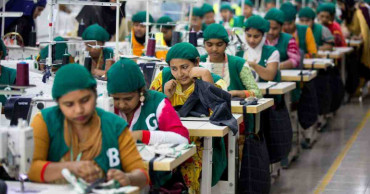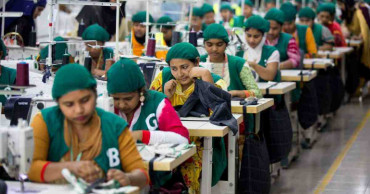developing economy
Bangladesh prepares to face challenges after transition from LDC
Bangladesh is focusing on bilateral free and preferential trade deals as a strategy to overcome the possible losses of global trade concessions after its graduation to a developing economy.
Studies on the feasibility of signing Free Trade Agreements (FTAs) and Preferential Trade Agreements (PTAs) with a number of countries have been completed, according to an official document.
Read:TRIPS transition period for LDCs extended by 13 years
The countries and organisations include Malaysia, Vietnam, Thailand, Japan and Eurasian Economic Commission.
The possibility of Bangladesh signing such trade agreements with China, Myanmar, Nigeria, Mali, Macedonia, Mauritius, Jordan, USA, Iraq and Lebanon is also being explored.
Meanwhile, a Comprehensive Economic Partnership Agreement (CEPA) between Bangladesh and India is also on the anvil.
Bangladesh Foreign Trade Institute (BFTI) and Indian Foreign Trade Institute are preparing a report on a joint study on CEPA.
Read Dhaka-Beijing ties can be prime mover for Bangladesh’s transformation: Debapriya
The CEPA is a bit different from FTAs as it covers a lot of issues such as trade in goods and services, investment, intellectual property rights and e-commerce.
Bangladesh has signed a bilateral PTA with Bhutan on December 6, 2020. Under the agreement, 34 Bhutanese products will get duty-free access to the Bangladeshi market and 100 Bangladesh products to get similar access to Bhutan.
The commodities from Bangladesh include baby clothes and clothing accessories, men's trousers and shorts, jackets and blazers, jute and jute goods, leather and leather goods, dry cell battery, fan, watch, potato, condensed milk, cement, toothbrush, plywood, particle board, mineral and carbonated water, green tea, orange juice, pineapple juice, and guava juice.
Read:Dhaka seeks incentive-based package for sustainable graduation of LDCs
The 34 products from Bhutan that will get duty-free access to the Bangladesh market include orange, apple, ginger, fruit juice, milk, natural honey, wheat flour, homogenised preparations of jams, fruit jellies, marmalades, food preparations of soybeans, mineral water, wheat bran, quartzite, cement clinker, limestone, wooden particle boards, and wooden furniture.
Both the countries will be able to increase the number of items gradually through consultation.
PTA negotiations with Nepal are at the final stage.
Read BGMEA discusses export, FDI opportunities with Bangladesh envoy
4 years ago
Developing nation: Bangladesh preparing plan to face challenges
The government is preparing an action plan that will focus on helping the businesses to be more competitive in exports to face the new challenges after its graduation to a developing economy.
The plan, being prepared by the Economic Relations Division, will include the strategies in the 8th Five Year Plan.According to a budgetary document, the government will continue to provide all possible policy supports to businesses and provide new forms of assistance as needed.
The government has taken multiple steps to increase the overall competitiveness of the country's trade and commerce to survive in the international market by competing with products from other countries, according to the document.Bangladesh will have at least five years to deal with the challenges of transitioning from a least developed country to a developing country.
Also read: BIDS publishes ‘Readings in Bangladesh Development’According to the United Nations Capital Development Fund (UNCDP) recommendation, Bangladesh's transition will be effective in 2026. It means until 2026, Bangladesh will be able to enjoy all these benefits applicable to LDCs.However, under the current rules, Bangladesh will be able to enjoy duty- and quota-free market access for another three years, i.e. until 2029, after entering the EU market.“During this period, traders in Bangladesh are expected to be able to improve their competitiveness in the international market,” Finance Minister AHM Mustafa Kamal said in his budget speech expressing his high hopes.Meanwhile, the government has taken various steps to address the challenges that Bangladesh will face as a result of its graduation from an LDC.The UNCDP upon the request of the government has recommended that against the backdrop of Covid-19 pandemic, the preparation period for the transition will be five years instead of three. During this period, that is, until 2026, all international facilities will continue.
Also read: Human Dev Index: Bangladesh moves 2 notches upThe LDC Group of the World Trade Organization (WTO) has put forward a proposal to ensure that all trade facilities pertaining to LDCs remain in force for another 12 years after transition.The document said that the government has already taken steps to avail of the advantage of GSP+ in EU countries after the graduation.Bangladesh on December 6, 2020 signed its maiden Preferential Trade Agreement (PTA) with Bhutan to boost bilateral trade between the two countries.
Meanwhile, Bangladesh and Sri Lanka have agreed to sign a Preferential Trade Agreement (PTA) allowing duty-free access to a range of goods between the two countries and thus boost bilateral trade further.Initiatives have already been taken to sign preferential trade agreements 11 other countries.The government has taken effective steps to improve its ranking in the Ease of Doing Business Index to increase the flow of foreign direct investment (FDI).The benefits of these steps are becoming evident, the document reads.On the other hand, the government has already taken steps to set up 100 special economic zones, high-tech parks for technological advancement and implementation of various mega projects including the Padma Bridge, which will help create new jobs and increase national income.The government is also in negotiations with development partners, trade partners and relevant international organizations to make sure that some important international facilities remain available event after the graduation."Steps have been initiated to conduct sector-wise research activities on the opportunities created by the graduation and what can be done to meet the challenges," the document reads.
4 years ago
Budget document: Preparations under way to face the challenges of developing economy
The government is preparing an action plan that will focus on helping the businesses to be more competitive in international export trade to face the new challenges after its graduation to a developing economy.
The plan, being prepared by the economic relations division, will include the strategies in the 8th Five Year Plan.According to a budgetary document, the government will continue to provide all possible policy supports to businesses and provide new forms of assistance as needed.
Read: Bangladesh's LDC graduation: Govt has its plan to face next challenges
The government has taken multiple steps to increase the overall competitiveness of the country's trade and commerce to survive in the international market by competing with products from other countries, according to the document. Bangladesh will have at least five years to deal with the challenges of transitioning from a least developed country to a developing country.According to the United Nations Capital Development Fund (UNCDP) recommendation, Bangladesh's transition will be effective in 2026. It means until 2026, Bangladesh will be able to enjoy all these benefits applicable to LDCs.However, under the current rules, Bangladesh will be able to enjoy duty-free and quota-free market access for another three years, i.e. until 2029, after entering the EU market.“During this period, traders in Bangladesh are expected to be able to improve their competitiveness in the international market,” Finance Minister AHM Mustafa Kamal said in his budget speech expressing his high hopes.Meanwhile, the government has taken various steps to address the challenges that Bangladesh will face as a result of its graduation from an LDC.The UNCDP upon the request of the government has recommended that against the backdrop of COVID-19 pandemic, the preparation period for the transition will be five years instead of three. During this period, that is, until 2026, all international facilities will continue.The LDC Group of the World Trade Organization (WTO) has put forward a proposal to ensure that all trade facilities pertaining to LDCs remain in force for another 12 years after transition.The document said that government has already taken steps to avail the advantage of GSP+ in EU countries after the graduation.Bangladesh on December 6, 2020 signed its maiden Preferential Trade Agreement (PTA) with Bhutan to boost bilateral trade between the two countries. Meanwhile, Bangladesh and Sri Lanka have agreed to sign a Preferential Trade Agreement (PTA) allowing duty-free access to a range of goods between the two countries and thus boost bilateral trade further.Initiatives have already been taken to sign preferential trade agreements 11 other countries.The government has taken effective steps to improve its ranking in the Ease of Doing Business Index to increase the flow of foreign direct investment (FDI).The benefits of these steps are becoming evident, the document reads.On the other hand, the government has already taken steps to set up 100 special economic zones, high-tech parks for technological advancement and implementation of various mega projects including the Padma Bridge, which will help create new jobs and increase national income.The government is also in discussion with development partners, trade partners and relevant international organizations will continue to ensure that some important international facilities remain available event after the graduation."Steps have been initiated to conduct sector-wise research activities on the opportunities created by the graduation and what can be done to meet the challenges," the document reads.
4 years ago




